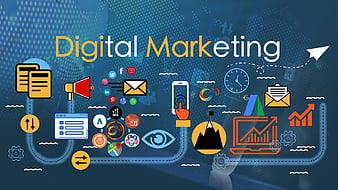Why your business need digital marketing In an era where digital interactions have become a cornerstone of everyday life, leveraging digital marketing is no longer an option but a necessity for business success. If you’re still unsure why digital marketing is essential, this guide will break it down in a way that’s easy to understand and actionable. 1. Reach a Larger Audience One of the most significant advantages of digital marketing is its ability to reach a vast and diverse audience. Unlike traditional marketing methods like print ads, TV spots, or billboards, which are limited by geography and demographics, digital marketing offers global reach. Whether you’re a local business or aiming to expand internationally, digital platforms allow you to connect with potential customers around the world. For instance, social media advertising lets you target users based on their interests, location, and online behavior, ensuring your message is seen by those most likely to be interested. 2. Cost-Effective Marketing Digital marketing is generally more budget-friendly compared to traditional marketing methods. Traditional advertising channels, such as TV commercials or magazine ads, often require a hefty budget, which can be prohibitive for small businesses. Digital marketing, however, offers flexible pricing and various options to suit different budgets. For example, platforms like Google Ads and Facebook Ads allow you to set daily or lifetime budgets and adjust them based on performance. Additionally, email marketing and social media engagement are cost-effective ways to reach and interact with your audience. 3. Measure and Analyze Performance One of the standout features of digital marketing is the ability to track and analyze performance in real-time. With tools like Google Analytics, you can monitor various metrics such as website traffic, conversion rates, and user behavior. This data provides valuable insights into how your campaigns are performing, allowing you to make data-driven decisions. For example, if you notice that a particular ad is driving a high volume of traffic but not converting, you can tweak the ad’s copy or targeting to improve results. This level of measurement and analysis is difficult to achieve with traditional marketing. 4. Enhance Your Brand’s Online Presence Building a strong online presence is crucial in today’s digital-first world. Digital marketing helps you establish and maintain a brand image across multiple platforms. A well-designed website, active social media profiles, and consistent content updates contribute to a robust online presence. This not only enhances brand recognition but also builds trust with potential customers. When users encounter consistent and high-quality content, they are more likely to perceive your brand as credible and trustworthy. 5. Engage Directly with Your Audience Unlike traditional marketing methods, digital platforms enable direct interaction between your business and your customers. Social media channels, blogs, and forums provide opportunities for two-way communication. Engaging with your audience through comments, messages, and reviews helps build relationships and foster loyalty. Additionally, this interaction offers valuable feedback, helping you understand customer needs and preferences. For instance, responding to reviews or addressing customer queries in real-time can significantly improve customer satisfaction. 6. Adapt to Market Changes Swiftly The digital landscape is dynamic, with trends and technologies evolving rapidly. Digital marketing allows you to stay agile and adapt quickly to these changes. Whether it’s adopting new social media platforms, utilizing advanced analytics tools, or responding to shifts in consumer behavior, digital marketing provides the flexibility to adjust your strategies in real-time. This adaptability is crucial for staying competitive in a fast-paced market..
